Related Research Articles

Foreign relations of Israel refers to diplomatic and trade relations between Israel and other countries around the world. Israel has diplomatic ties with 164 of the other 192 UN member states as of December 2020. Israel is a member of the United Nations (UN) and a number of other international organisations. Israel maintains full diplomatic relations with two of its Arab neighbours, Egypt and Jordan, after signing peace treaties in 1979 and 1994 respectively. In 2020, Israel signed agreements establishing diplomatic relations with four Arab League countries, Bahrain, the United Arab Emirates, Sudan and Morocco. As of 2021, Israel had formal diplomatic relations with 168 other countries, while twenty-eight UN member states have either never established, or have broken off diplomatic relations with Israel.

Ahmad al-Shukeiri was the first Chairman of the Palestinian Liberation Organization, serving from 1964–1967.
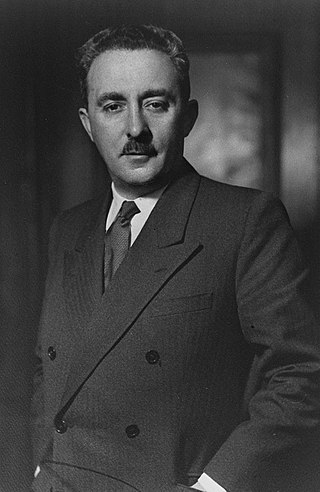
Moshe Sharett was an Israeli politician who served as the second prime minister of Israel from 1954 to 1955. A member of Mapai, Sharett's term was both preceded and succeeded by the premiership of David Ben-Gurion. Sharett also served as the country's first foreign minister between 1948 and 1956.
This article lists expulsions, refugee crises and other forms of displacement that have affected Jews.

Ángel Sanz-Briz was a Spanish diplomat and humanitarian. Sanz is credited with saving more than 5,200 Jews in German-occupied Hungary from the Holocaust during the later stages of World War II.

Egyptian Jews constitute both one of the oldest and one of the youngest Jewish communities in the world. The historic core of the Jewish community in Egypt mainly consisted of Egyptian Arabic speaking Rabbanites and Karaites. Though Egypt had its own community of Egyptian Jews, after the Jewish expulsion from Spain more Sephardi and Karaite Jews began to migrate to Egypt, and then their numbers increased significantly with the growth of trading prospects after the opening of the Suez Canal in 1869. As a result, Jews from many territories of the Ottoman Empire as well as Italy and Greece started to settle in the main cities of Egypt, where they thrived. The Ashkenazi community, mainly confined to Cairo's Darb al-Barabira quarter, began to arrive in the aftermath of the waves of pogroms that hit Europe in the latter part of the 19th century.
Samuel Toledano was a Spanish Jewish community leader and lawyer. As a descendant of an old Jewish family from medieval Toledo, Samuel (Sam) Toledano was a secretary-general and president of Spain's Jewish federation of Israelite communities, later known as the Federation of Jewish Communities of Spain (FCJE) from 1982–1994. For 36 years, he was one of the most prominent Jewish leaders in Spain.
Richard H. Nolte was an American Middle East expert and diplomat. Nolte was the second director of the Institute of Current World Affairs. He was appointed ambassador to the United Arab Republic, which was the name of Egypt at the time, but never served due to the Six-Day War.
Fritz Katz was a pioneer in organ transplant techniques, performing one of the first successful grafts of adrenal glands.

Egypt–Palestine relations are the bilateral relations between the Arab Republic of Egypt and the State of Palestine. Egyptian President Gamal Abdel Nasser was a strong supporter of the Palestinian cause and he favored self-determination for the Palestinians. Although the Egyptian government has maintained a good relationship with Israel since the Camp David Accords, most Egyptians strongly resent Israel, and disapprove of the close relationship between the Israeli and Egyptian governments.
Hussein Salem was an Egyptian businessman, co-owner of the East Mediterranean Gas Company (EMG), and ally and advisor to former president Hosni Mubarak. He was also the chairman and CEO of HKS Group, a hospitality company that operates Maritim Jolie Ville Resort in Sharm El Sheikh. He was described as "one of the most secretive businessmen in Egypt", a mogul, and Mubarak's close confidant. He was known as the "Father of Sharm El Sheikh" due to his resort development activities. Per Suisse secrets held accounts at Credit Suisse for years, even after he had been publicly accused of bribery.
Antisemitism in Venezuela has occurred throughout the history of the Jews in Venezuela. However, under the presidencies of both Hugo Chávez and Nicolás Maduro, allegations of antisemitism grew following actions and statements by the Venezuelan government, while also occurring in public incidents. The Bolivarian government would also use the words of "Jewish" and "Zionist" interchangeably in order to avoid accusations of antisemitism.
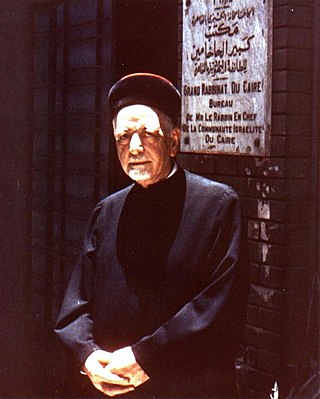
Rabbi Haim Moussa Douek (1905–1974) was the last Chief Rabbi of Egypt.
Omar Abdel Aziz Sharaf was an Egyptian career diplomat, an Assistant Secretary General of the Arab League, a Deputy Representative of the UNHCR for the Middle East, as well as an Omani and international diplomat. He was a Commander Grand Cross of the Order of the Polar Star, a recipient of the Order of Merit, First Class, and a recipient of the Order of the Republic, Second Class. He was also a lawyer, a member of the Egyptian Bar association, who until his death in 1993, was Doyen of a family clan of diplomats, politicians, linguists and lawyers.

The Angel is an Israeli spy thriller film directed by Ariel Vromen and starring Marwan Kenzari and Toby Kebbell among others. It is an adaptation of the non-fiction book The Angel: The Egyptian Spy Who Saved Israel written by Uri Bar-Joseph. It is a fictional account of an Ashraf Marwan, a high-ranking Egyptian official who became a double agent for both countries and helped achieve peace between the two.
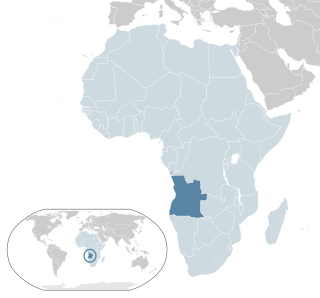
The recorded history of the Jews in Angola stretches from the Middle Ages to modern times. A very small community of Jews lives in Angola mostly in the capital city of Luanda with a handful scattered elsewhere of mixed origins and backgrounds. There are also a number of transitory Israeli businesspeople living in Angola.
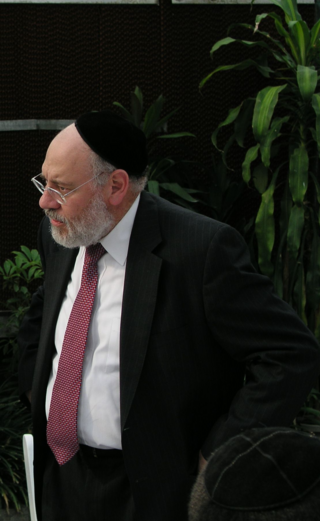
Rabbi Albert E. (Abraham) Gabbai is an American rabbi, serving as the rabbi of the Sephardic synagogue Congregation Mikveh Israel since 1988. Mikveh Israel was founded in 1740, and is the second-oldest active congregation in the United States.
The history of the Jews in Alexandria dates back to the founding of the city by Alexander the Great in 332 BCE. Jews in Alexandria played a crucial role in the political, economic, cultural and religious life of Hellenistic and Roman Alexandria, with Jews comprising about 35% of the city's population during the Roman Era. Alexandrian Jewry were the founders of Hellenistic Judaism and the first to translate the Torah from Hebrew to Koine Greek, a document known as the Septuagint. Many important Jewish writers and figures came from or studied in Alexandria, such as Philo, Ben Sira, Tiberius Julius Alexander and Josephus. The position of Alexandria's Jewry began deteriorating during the Roman era, as deep antisemitic sentiment began developing amongst the city's Greek and Egyptian populations. This led to the subsequent Alexandrian pogrom in 38 CE and the Alexandria riot in 66 CE, which was in parallel with the outbreak of the First Jewish–Roman War. Alexandria's Jewry began to diminish, leading to a mass immigration of Alexandrian Jews to Rome, as well as other Mediterranean and North African cities. By the beginning of the Byzantine era, the Jewish population had again increased, but suffered from the persecutions of the Christian Church. During the subsequent Muslim conquest of Egypt, the number of Jews in Alexandria increased greatly, with some estimates numbering around 400,000. Following the establishment of the State of Israel in 1948, and the ensuing Six-Day War in 1967, almost all of Alexandria's Jewish population were expelled from the country and immigrated to Israel.
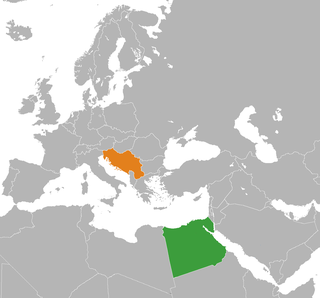
Egypt–Yugoslavia relations were historical foreign relations between Egypt and now break-up Yugoslavia. Both countries were founding members and prominent participants of the Non-Aligned Movement. While initially marginal, relations between the two Mediterranean countries developed significantly in the aftermath of the Soviet-Yugoslav split of 1948 and the Egyptian revolution of 1952. Belgrade hosted the Non-Aligned movement's first conference for which preparatory meeting took place in Cairo, while Cairo hosted the second conference. While critical of certain aspects of the Camp David Accords Yugoslavia remained major advocate for Egyptian realist approach within the movement, and strongly opposed harsh criticism of Cairo or proposals which questioned country's place within the movement.
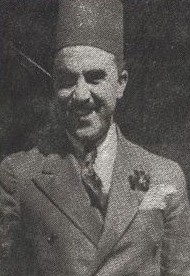
Amin Osman, also known as Amin Osman Pasha, was an Egyptian judge and politician who served as finance minister in the period 1943–1944. He was assassinated by Hussein Tawfik, who was connected with the Egyptian army officers, on 5 January 1946.
References
- 1 2 3 "Ambassadors and their Wives, Biographies (" (PDF). Betty Ford White House papers. Gerald Ford Presidential Library . Retrieved 7 July 2023.
- 1 2 3 "Angel Sagaz, Envoy to U.S. From Spain, Is Dead at 61". New York Times . United Press International. 7 May 1974.
- 1 2 3 4 5 6 7 Rein, Raanan (2006). "Diplomacy, Propaganda, and Humanitarian Gestures: Francoist Spain and Egyptian Jews, 1956–1968" (PDF). Iberoamericana. 6 (23): 21–33. Retrieved 7 July 2023.
- 1 2 3 4 Carrion, Francisco (11 June 2017). "El ángel español que liberó a 1.500 judíos presos en Egipto". El Mundo . Retrieved 7 July 2023.
- 1 2 "Angel Sagaz dies; Spanish diplomat" (PDF). Washington Post. U.S. House of Representatives. 7 May 1974. Retrieved 7 July 2023.